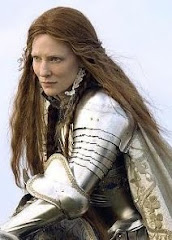
I think the one thing above all that struck me the first time I read McKee's Story was his concept of switching between polar values. The idea solidified a slew of thoughts that had been burrowing somewhere in the grey matter.
McKee delineates a novel that, at pretty much any level (act, chapter, paragraph), swings remorselessly from a positive charge to a negative charge. (Naturally, he expands this idea, but I'd like to hold it here for now.)
In this way, the narrative becomes dynamic - never static.
It's a simple concept, and one that I've yet to read elsewhere, at least, not defined so fundamentally.
In running a second pass over my new opening to Tethered Light, I found myself contemplating where these charges begin and end.
Consider these two approaches:
A) Protag is thrown into a breathless sequence of perils.
B) Protag is thrown into a sequence of perils, each punctuated with hope.
In approach A, the charge intensifies rather than switches, and the narrative is still, as such, dynamic.
In approach B, the emotional topography is more varied, but the pace appears to be marginally diluted.
I've taken a step back to consider these two approaches.
Currently, my protag is escaping the nomads, riding on Blinky's back (hope [here, we're in approach B with the charge switching rapidly between hope and hopelessness]), only to find the way back obstructed by two nomads (hopelessness). She shouts to Blinky to change direction and head to the ridge (hope), but the ground gives way and they plummet into a chasm (hopelessness).
Here, I've been wrestling with her feelings as she falls, and I've been debating how long I should hold the moment.
Given that the charge is currently negative, I find myself deliberating over the next cookie.
If she is immediately plucked from the air by a winged beast, the charge becomes confused and I should try to split it temporally: the charge is positive because she has been rescued, but she quickly realizes (it's my job as author to show and control this) that she is being carried to more danger, and the charge switches to negative.
Two switches within a single action.
However, if she considers a sort of peace as she falls - a silent free-fall in which she is liberated from responsibilities (foreshadowing a later plummet), does the charge become positive? If so, does this negate any positive value that might be found in the act of being rescued by the beasts? Does the reader recognize a pattern of swapping values and stumble if this pattern appears to be disturbed, or encourage a swing that might otherwise be borderline?
Is pace pupeteered by the dynamic swapping of value charges?
I'll have to experiment with some extremes and observe the effects.
McKee delineates a novel that, at pretty much any level (act, chapter, paragraph), swings remorselessly from a positive charge to a negative charge. (Naturally, he expands this idea, but I'd like to hold it here for now.)
In this way, the narrative becomes dynamic - never static.
It's a simple concept, and one that I've yet to read elsewhere, at least, not defined so fundamentally.
In running a second pass over my new opening to Tethered Light, I found myself contemplating where these charges begin and end.
Consider these two approaches:
A) Protag is thrown into a breathless sequence of perils.
B) Protag is thrown into a sequence of perils, each punctuated with hope.
In approach A, the charge intensifies rather than switches, and the narrative is still, as such, dynamic.
In approach B, the emotional topography is more varied, but the pace appears to be marginally diluted.
I've taken a step back to consider these two approaches.
Currently, my protag is escaping the nomads, riding on Blinky's back (hope [here, we're in approach B with the charge switching rapidly between hope and hopelessness]), only to find the way back obstructed by two nomads (hopelessness). She shouts to Blinky to change direction and head to the ridge (hope), but the ground gives way and they plummet into a chasm (hopelessness).
Here, I've been wrestling with her feelings as she falls, and I've been debating how long I should hold the moment.
Given that the charge is currently negative, I find myself deliberating over the next cookie.
If she is immediately plucked from the air by a winged beast, the charge becomes confused and I should try to split it temporally: the charge is positive because she has been rescued, but she quickly realizes (it's my job as author to show and control this) that she is being carried to more danger, and the charge switches to negative.
Two switches within a single action.
However, if she considers a sort of peace as she falls - a silent free-fall in which she is liberated from responsibilities (foreshadowing a later plummet), does the charge become positive? If so, does this negate any positive value that might be found in the act of being rescued by the beasts? Does the reader recognize a pattern of swapping values and stumble if this pattern appears to be disturbed, or encourage a swing that might otherwise be borderline?
Is pace pupeteered by the dynamic swapping of value charges?
I'll have to experiment with some extremes and observe the effects.







